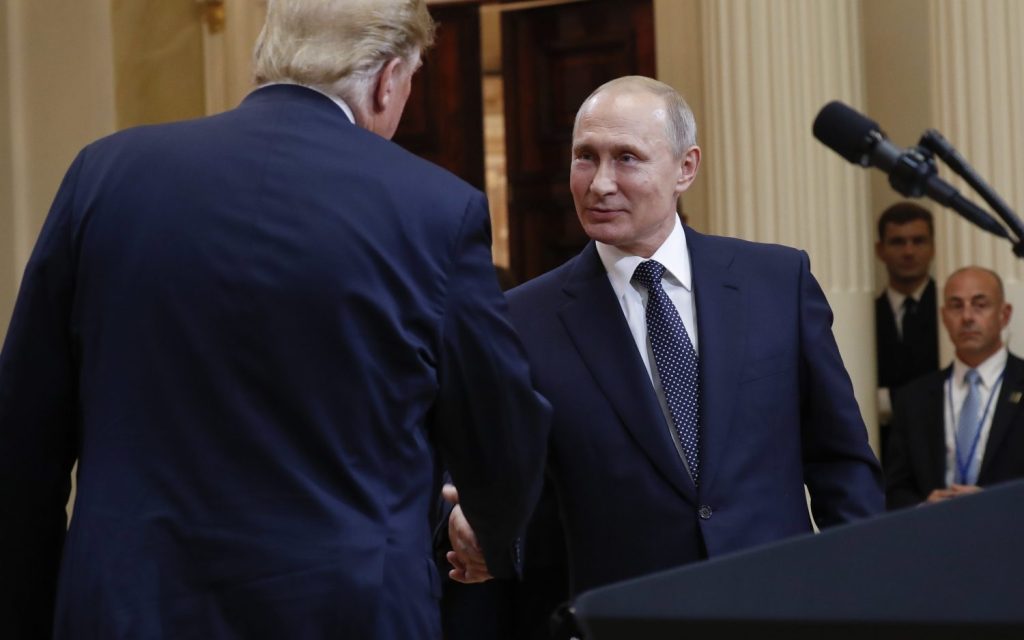Trump and Putin Set to Negotiate Ceasefire and Land Deals to Resolve Ukraine Conflict

President Donald Trump announced that he plans to speak with Russian President Vladimir Putin on Tuesday morning to discuss potential steps to end the ongoing war in Ukraine. The conversation will likely center on territorial agreements from Ukraine and the control of the Zaporizhzhia nuclear power plant. While acknowledging the situation in Ukraine is dire, Trump expressed optimism that a peace agreement and ceasefire could be negotiated and that the U.S. and Russia might resolve.
Trump has been pushing for a 30-day ceasefire proposal, which Ukraine accepted last week. However, despite this, both sides continued heavy aerial attacks on Monday, with Russian forces edging closer to Ukrainian troops in the Kursk region. Trump noted that Ukrainian soldiers in Kursk are in a tough spot, surrounded by Russian forces. He also suggested that his decision to stop military aid to Ukraine earlier in the month, combined with his meeting with Ukrainian President Volodymyr Zelenskyy, may have nudged Ukraine to accept the ceasefire proposal.
In his evening address, Zelenskyy accused Putin of dragging out the war, pointing out that Putin had known about the ceasefire proposal for a week. He emphasized that every day of conflict results in more lives lost.
When asked about what concessions might be on the table during ceasefire talks, Trump mentioned that discussions would likely cover territorial matters and power plants. He referred to the Zaporizhzhia nuclear plant, which is under Russian control, as a potential point of discussion. Both sides have accused each other of risking a disaster at the facility. Trump confirmed that the talks would address power plants along the border between Russia and Ukraine, although he did not provide further specifics.
The White House later confirmed that Trump and Putin would discuss a power plant on the border, but Kremlin spokesperson Dmitry Peskov declined to comment on Trump’s remarks about territorial and power plant issues. On Friday, the Kremlin revealed that Putin had sent a message to Trump about the ceasefire plan, expressing cautious hope that an agreement could be reached.
However, U.S. officials, including Secretary of State Marco Rubio and National Security Adviser Mike Waltz, cautioned that significant obstacles remain before a ceasefire, let alone a lasting peace deal. Waltz questioned whether the U.S. would accept a peace agreement that allowed Russia to keep the territory it had captured, suggesting that a realistic solution might not involve Russia relinquishing every inch of Ukrainian land.
Zelenskyy has consistently stated that Ukraine’s sovereignty is non-negotiable and that Russia must return all seized territories, including Crimea, which Russia annexed in 2014, and the four eastern Ukrainian regions occupied since Russia’s 2022 invasion.
Russia, for its part, has made it clear that it would require “ironclad” security guarantees in any peace agreement. These guarantees include Ukraine’s neutrality and exclusion from NATO. Additionally, Russia seeks to retain control of the Ukrainian territory it has seized, limit the size of Ukraine’s military, and have Western sanctions lifted. Moscow also insists on a presidential election in Ukraine, which Kyiv argues is impossible while martial law is in effect.
Putin has justified Russia’s actions in Ukraine as a measure to protect national security, particularly against the eastward expansion of NATO. In contrast, Ukraine and its Western allies view Russia’s invasion as an unprovoked act of aggression aimed at territorial expansion.
Kaja Kallas, the EU’s foreign policy chief, stated that Russia’s conditions for a ceasefire demonstrate that Moscow is not genuinely seeking peace. British Prime Minister Keir Starmer noted that several countries, including the UK and France, are willing to send peacekeeping troops to Ukraine if a peace agreement is reached. However, Russia has rejected the idea of peacekeepers until the war ends, with Russian official Alexander Grushko suggesting that only unarmed observers, not peacekeeping troops, could be involved.
